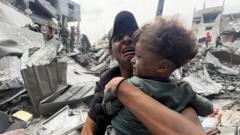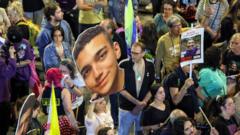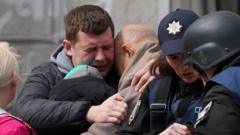On Tuesday morning, an Israeli air strike in Gaza resulted in the deaths of at least 29 Palestinians, including eight children, and injured over 60, as local and international organizations urge immediate humanitarian assistance amid ongoing violence and displacement in the region.
Israeli Airstrike Claims 29 Lives in Gaza, Including Children

Israeli Airstrike Claims 29 Lives in Gaza, Including Children
A devastating airstrike in Gaza's Shejaiya neighborhood has left multiple casualties, including children, igniting international outcry regarding the humanitarian crisis.
At least 29 Palestinians are reported dead following an Israeli airstrike on a multi-storey residential building in the Shejaiya neighborhood of Gaza City, as confirmed by a local hospital. The predawn attack targeted the vicinity of al-Hawashi mosque on Tuesday morning, according to the Hamas-run Civil Defence agency. Among those killed are eight children, with over 60 individuals wounded; rescuers continue to search through the rubble for an estimated two dozen missing persons.
The Israel Defense Forces (IDF) claimed the strike targeted a senior Hamas figure responsible for orchestrating attacks in the region, stating that "precision weapons" were used to reduce civilian casualties. The military also accused Hamas of intentionally putting civilians in harm's way, violating international law by utilizing them as human shields.
Eyewitness accounts describe a scene of chaos and destruction. Ayub Salim, a resident of the area, shared his harrowing experience, stating that the building was hit by multiple missiles in a densely populated area filled with tents and homes. "Dust and massive destruction filled the entire place, we couldn't see anything, just the screams and panic of the people," he recounted emotionally.
Hamas condemned the airstrike as a "bloody massacre," highlighting the mounting toll on the already affected civilian population. Prior to this incident, Gaza's health ministry reported at least 33 fatalities from Israeli attacks in the preceding 24 hours, raising the overall toll since 18 March to 1,482. Approximately 390,000 people have become displaced during the past three weeks due to the ongoing conflict, with two-thirds of Gaza now designated by the Israeli military as "no-go" zones.
The United Nations has also raised serious concerns over the humanitarian crisis in the region, emphasizing the severe lack of food, medical supplies, and fuel due to Israel's blockade, which has persisted for over a month. Secretary-General António Guterres criticized the blockade as a violation of international law, describing the current situation in Gaza as a "killing field."
In reaction, an Israeli spokesperson refuted Guterres' statements, claiming there is no humanitarian aid shortage and arguing that Hamas has used aid resources to fortify its military capabilities. Humanitarian agencies have sharply contradicted such claims, asserting that food scarcity is a grim reality for Gaza's 2.1 million residents.
The international community continues to call for immediate action in addressing the humanitarian needs and renewing peace negotiations. Following a lull in violence earlier this year, the ceasefire collapsed as Israel resumed operations, citing Hamas’s refusal to agree on further releases of hostages. The escalating conflict, which began in response to a shocking cross-border assault in early October, highlights the ongoing crisis affecting thousands of families caught in the crossfire. The humanitarian situation in Gaza remains precarious, with civilians suffering the most severe consequences.


















